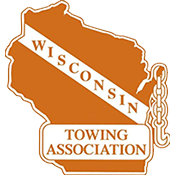349.13 Authority to regulate the stopping, standing or parking of vehicles.
(1b) In this section, “owner” includes the lessee of a vehicle if the vehicle is registered, or required to be registered, by the lessee under ch. 341.
(3) Whenever any traffic officer finds a vehicle standing upon a highway in violation of a prohibition, limitation or restriction on stopping, standing or parking imposed under ch. 346 or this section, or a disabled vehicle that obstructs the roadway of a freeway or expressway, as defined in s. 346.57 (1) (ag), the traffic officer is authorized to move the vehicle or to require the operator in charge thereof to move the vehicle to a position where parking is permitted or to either private or public parking or storage premises. The removal may be performed by, or under the direction of, the traffic officer or may be contracted for by local authorities. Any charges for removal shall be regulated by local ordinance. The operator or owner of the vehicle removed shall pay the reasonable charges for moving or towing or any storage involved based upon the ordinance.
(3m) No vehicle involved in trespass parking on a private parking lot or facility shall be removed without the permission of the vehicle owner, except upon the issuance of a repossession judgment or upon formal complaint and a citation for illegal parking issued by a traffic or police officer.
(4) In counties having a population of 500,000 or more whenever any traffic officer finds a vehicle disabled so as to cause a hazard on any portion of the interstate system, limited access highway or any expressway, even though it may be impossible for the operator to avoid stopping or temporarily leaving the vehicle thereon, the county may remove such vehicle to a position where parking is permitted or to either private or public parking or storage premises. The removal may be performed by such officer or under the officer’s direction or such removal may be contracted for by such counties and any charges shall be regulated by ordinance. The operator or owner of the vehicle removed shall pay a reasonable charge for moving or towing or any storage involved based upon said ordinance.
(5)
(a) No person who removes or stores a vehicle under subs. (3) to (4) or otherwise at the request of a law enforcement officer, and no person who removes or stores a disabled vehicle, accident debris or other object that obstructs the roadway of a freeway or expressway, as defined in s. 346.57 (1) (ag), may incur any civil liability for the act, except for civil liability for failure to exercise reasonable care in the performance of the act or for conduct that is willful, wanton or malicious.
(b)
(RELEASE OF PERSONAL PROPERTY)
1. As used in this paragraph:
- “Personal property” means all property within the vehicle which is not mounted, attached or affixed to the vehicle.
- “Proper identification” means identification which would be sufficient to establish ownership to release the vehicle.
2. A person who has custody of a vehicle removed or stored under subs. (3) to (4) or otherwise at the request of a law enforcement officer shall release the personal property within the vehicle to the owner of the vehicle during regular office hours upon presentation by the owner of proper identification.
3. No charge may be assessed against the owner for the removal or release of the personal property.
4. If the owner removes the personal property from a motor vehicle under this paragraph, the vehicle shall be deemed abandoned unless the person enters into a written agreement to pay the full charges for towing and storage. The owner shall be informed of this subdivision by the person who has custody of the vehicle before the property is released. A vehicle deemed abandoned under this subdivision may be disposed of as are other abandoned vehicles by the local authority.
5. The personal property is subject to forfeiture under ss. 961.55 to 961.56 and 973.075 to 973.077.
History: 1973 c. 248; 1975 c. 299; 1977 c. 29 ss. 1654 (3), (8) (a), 1656 (43); 1977 c. 116, 272, 418; 1979 c. 34, 59, 231, 276, 325; 1981 c. 227; 1981 c. 255 ss. 10, 11, 13; 1983 a. 77 s. 15; 1983 a. 213; 1985 a. 29; 1985 a. 87 s. 5; 1989 a. 304; 1991 a. 269, 316; 1993 a. 246; 1995 a. 448; 1997 a. 27, 159, 258; 1999 a. 85.
Legislative Council Note, 1977: The last 2 sentences of sub. (1) are eliminated as unnecessary. These sentences contain explanations of what is meant by a sign which indicates that stopping or standing is prohibited and what is meant by a sign prohibiting parking. Although these explanations attempt to explain the conduct required of motorists by these signs, they do not define the key terms, “park or parking” and “stand or standing”. In place of these explanations, definitions of the terms “park or parking” and “stand or standing” are created in 340.01 (42m) and (59m) in this bill. “Stop” is presently defined in s. 340.01 (62). [Bill 465-A]
It is not a violation of due process to tow an illegally parked car without first giving the owner notice and the opportunity to be heard regarding the lawfulness of towing the car. Sutton v. City of Milwaukee, 672 F.2d 644 (1982).
